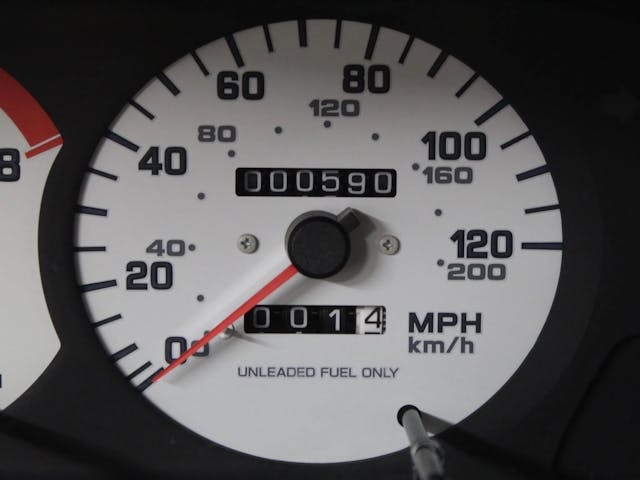On shills and chandeliers: The murky world of fake bids
Most of the internet has been abuzz with The Slap, but for those of us who spend time in the car-obsessed corners of social media, this week has actually been all about The Shill. For those of you who missed out: A 240SX initially represented on Bring a Trailer with 590 miles drove into crosshairs of savvy commenters, who pointed out various signs that the car had undergone significant paint work. Bring a Trailer modified the description, but comments soon spotted another, even more serious issue: The high bidder was none other than the seller, Gary Duncan of Duncan Imports.
Most of the reporting thus far, including on YouTube and The Drive, has focused primarily on the players—what Duncan intended; what Bring a Trailer (who pulled the listing) knew or should have known; and the vital role of car forums, as much of the debunking happened on Zilvia.net. All good questions, but we were more interested in the game: Is the instance of shill bidding we just witnessed an aberration, or is it rare only in that the shill bidder got caught?
We spoke to several industry insiders about the listing. None wanted to go on record, both for fear of antagonizing Bring a Trailer—a vital outlet for sellers these days—and because much is still unclear about this incident. Nevertheless, almost everyone we spoke to agreed upon two points: 1) Shill bidding is not uncommon 2) It happens everywhere, but might be easier to do online.
Let’s start with the second point. Everyone we spoke to was careful to note that issues with bidder authenticity have been going on as long as there have been auctions and still occur regularly at in-person sales.
Start with the fact that at in-person auctions, the auctioneer is legally allowed to bid a car up to its reserve price (a practice known as “chandelier bidding”). This is why Insider is typically careful to describe an unsold car’s high bid as “reported.” It’s also not unheard of for a seller’s friends or associates to raise a paddle. The speed and frenetic energy of in-person auctions—which auctioneers are trained to cultivate—can also lend themselves to funny business.
Yet there are some natural brakes on nefarious actors. First and foremost, auctioneers want to sell the cars, not just call out high prices. Shill bidders create a real risk of driving the price too high for the actual bidders, and sending the consigner and auction company home with nothing to show for their efforts. For this reason, an auctioneer will often exercise restraint even in the “legitimate” chandelier bidding. In many cases an auction company will decide to waive some of its fees to get a consigner to let a car go under the reserve price—not an option if the high bid is imaginary. Reputable auction companies also go to great lengths to verify the identities of bidders and to ban those who break their rules.
Most of the above safeguards also apply at online auctions. None of the platforms want shill bidders for the very reasons we saw this week—it can result in reputational cost, not to mention an unsold car. Most platforms, Bring a Trailer included, require a credit card and other identity checks to register as a bidder. Online auctions also have some inherent advantages when it comes to transparency: They usually elapse over a longer period—”More time for bidders to take cold showers,” as one dealer put it—and provide ample opportunity for third-party experts to uncover shady activity, which is exactly what happened with the 240SX.

Yet there are also advantages for potential shill bidders online. The most obvious is the anonymity the internet provides. Duncan happened to use a known account tied to him (and has claimed, both on Bring a Trailer and to The Drive, that he was not trying to mislead others); the more devious and harder to detect move would be to create a different account or ask a buddy to bid. Online auction companies try to verify identities behind accounts, but most admit it’s a tall task, given the numbers—Bring a Trailer alone claims 300,000 registered bidders in addition to 700,000 commenters. There’s also the fact that most online auction companies, compared to their in-person peers, have less skin in the game. Most do not take physical possession of the car or title, nor are they party to the actual transaction.
Oftentimes, the shill bidding becomes apparent to end users only in retrospect. If a car gets listed as “sold” then reappears at auction weeks later, something might be up. A much higher than expected sale price might also be a sign of illegitimate activity (although it’s just as likely to be just an outlier).
No matter the platform, shill bidding is unfortunately baked into the auction format, where you have many people competing for a financial and psychological edge. “Saying you can stop shill bidding is like saying you can exist on earth without water,” quipped one expert. A bidder’s only protection is their own knowledge and skepticism: Research how much a car is worth before placing a bid and be wary of getting caught in the heat of the moment. Of course, these personal protections are no different than what one should take when buying a car from anyone. As the same expert noted, “I’ve been ripped off far worse by a private seller than I ever have been at auction.”
***
Check out the Hagerty Media homepage so you don’t miss a single story, or better yet, bookmark it. To get our best stories delivered right to your inbox, subscribe to our newsletters.


